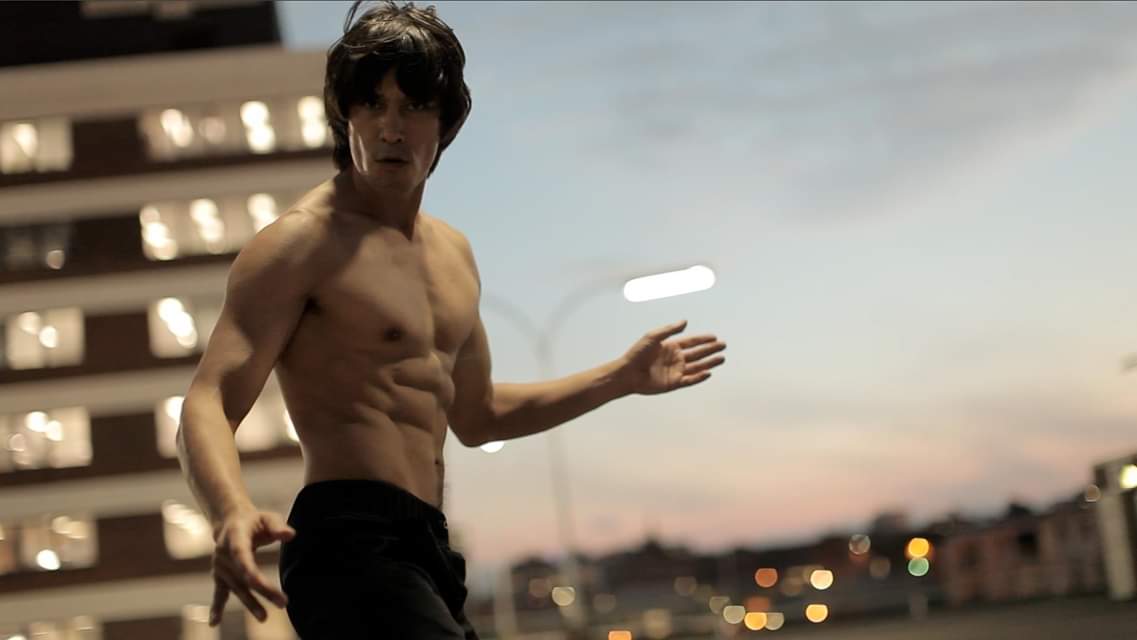
Sunday Spotlight | Hussain Sadiqi – Art of Hope | Part 2
Part 2 of 2
Last week we discussed with Hussain Sadiqi, JSU’s Global Ambassador, the beginning of his journey and involvement with films. Today, we will discuss his love of martial arts along with his current plans and future hopes.
A brief biography before we begin:
Born in a remote village in the high mountains of central Afghanistan, this Bruce Lee-inspired martial artist was smuggled to Australia after a Taliban attack on his village. He went on to win an award for his fight scene in the movie, “Among Dead Men” as well as a gold medal in a Wushu Kung Fu championship. After having spent nearly fourteen years away, he returned to Afghanistan to found several martial arts academies. Unfortunately, the Taliban attacked again and a car explosion near one of his academies not only destroyed the equipment but also injured a student. After being forced to shut down all but one of his academies, Sadiqi continued to fight for peace in Afghanistan. For six years, he has been working tirelessly for the Afghan Hope Association to bring hope and peace to the Afghan people.
(Mr. Sadiqi right after winning gold at the World Martial Arts Festival in 2012)
Speaking of the martial arts academy that you started for youths, what about martial arts inspires you?
Well, martial arts for me was like a key. A key to open doors for me, to see the world. When I was about six or seven years old, I used to live in a mountainous area in a highland of Afghanistan. Every single day, on my walk from my village to another village for school, I would look around and see these big mountains. It was about an hour’s walk and I would always look at those high mountains and wonder what was behind them. That was a big question for me, because all I saw at that age was my village and the other village where I went to school.
There was this one guy who was older than me, maybe four or five years older. One day I asked him, ‘what is behind those mountains?’. He looked at me, looked at them, and then said, ‘that is the end of the world. Behind those mountains it’s the end of the world. There is nothing behind those mountains.’
It became a big dream for me to one day, climb over those mountains. To go beyond them and see: What is the end of the world? What does it look like? And that’s why I travel so much. It was because of those questions, which have been on my mind since childhood. When I found martial arts, it was the key for me to open all those gates, all those doors. It gave me passion, a desire to work hard to find what I’m looking for, and so when I came back to Afghanistan, I wanted to give that same passion to my students. That they can reach their dreams, whatever dreams they have, through martial arts.
(Hussain with some of his students in Afghanistan)
You’ve said in the past that hope is what keeps you going and motivated. You wanted to give back to the youth and increase their awareness for martial arts as well. Could you describe how you started the Afghan Hope Foundation?
After the car explosion at my academy happened, I went to Australia for a few months. In 2018 I went back to Afghanistan to work on Peace and Hope. The War in Afghanistan, as part of the global war on terrorism, has been the longest American war (from 2001 to the present). Within Afghanistan, the war has been going on for 41 years, since 1979 until now [2020]. The country has been oppressed by its past and it’s affecting the people and making them lose hope. All of these kids, from the time they’re born, they see war, killings, fire, and explosions. They have no hope for anything because from the time they’re born until now, it’s all the same. The situation doesn’t change. I was born in that same situation and I’ve seen it and have experienced it in my own life.
Then I went to other countries and saw how people live over there. I saw how people can have plans for tomorrow, next week, next month, even sometimes for the next 10 years. They have plans. But in Afghanistan, no one has plans even for the next hour because they have no hope.
People leave their homes and they go to work or to school and they don’t know if they’ll come back in the afternoon—which has happened hundreds of times. Explosions happen near their homes, near their schools; I have seen this happen with my own eyes.
One time, I was stuck in a traffic jam in Kabul. After I left that area, maybe only fifteen seconds later, a big explosion happened. Thirty-seven people were killed and many cars were completely burned. My car was hit by, what I think was, shrapnel. This is what life is like in Afghanistan. And this is why I, with my experiences in the past and present, want to come and wake up that part of their body, their mind. The only thing we can live with is hope. If you have hope, you can live and you can make plans for your life. Without hope you are breathing, but you’re not alive. That was the main reason I came back to Afghanistan. Martial arts did good things for me, which is why I want to share it with others.
We were discussing earlier how you wanted to take on a more active political role in this chapter of your life. What has sparked this desire to be more active politically rather than stay within the martial arts? Or have you always been interested in politics?
When I was a teenager, there was a political party that belonged to the Hazara people called ‘Wahdat’. ‘Wahdat’ means Unity. At that time, I was highly focused on martial arts and was a national champion, so I kind of became a ‘face’ for that party. I used to have exhibitions and demonstrations and when people would come to watch, Wahdat would advertise themselves. Now, most of the people that used to be involved in that party are higher-up in the government. One of them even became the Vice-President for ten years during Karzai’s government. When I went back, because of my past, I knew all of them and they knew me.
Most of my friends are politicians. The reason I decided to become more politically active now is because I realized that in order to bring safety, security and stability to Afghanistan we must work peacefully with someone who has never been directly involved with war and believes in our youth. We could change Afghan’s policy towards my people and stop the four decades of bloodshed that has marked my country. Just yesterday the Taliban attacked an education center in Kabul and killed over thirty teenaged students and left many more wounded who’d come to study for the university entrance exam.
The Hazara have faced huge discrimination for almost 140 years. Even though we have representatives, they can’t really do anything. They have the title, but not the power. If someone new comes into power, maybe the Hazara situation will change. That’s why this time I’m not just working for sports, but I want to work for peace and hope within the whole country. It’s a much bigger challenge and risk.
Politics is a gamble. Nobody knows if you will win or lose and it’s very hard to win. But I saw an opportunity to maybe do something for the whole country, especially for Hazaras. We are almost 12 million people in Afghanistan. This is why I’m not going to only work for the Sports section; I want to work for the whole country to improve the political, economic, and social lives of my people.
I wish you luck in that new project. One final question, more about this project we’re working on together with Just Show Up. What made you interested in helping with this type of project?
This is a good question. I love JSU and I have to thank Eangelica [Aton, Founder of JSU] for introducing me to it. Everywhere I go, I see people who have poor habits with eating, sleeping, and drinking. Even if they are in training, they kind of train with problems. When they get injured, they have no idea what to do. This is an opportunity for all of us, but especially for me, to explain all of these problems to the whole world, not just with an individual. It’s an opening for us to train people and to help them create best habits for life. To show them a better way of living in this world, and enjoy their life. We can teach them how to eat well, when to drink, how to drink–not alcoholic drinks, but different drinks which are good for them. They can learn about proper sleep habits and different sport training for different age groups.
A big problem for every person in sports, especially in professional sports, is getting injured. When they get injured, sometimes they don’t know how to treat their injuries. Many athletes don’t only have one injury; they can end up with a few. I myself had a knee problem and had surgery on the knee. I have had surgery nine times on my knee. Nine times! That’s why I know how hard recovery is for someone who has had an injury. Most people, even professional athletes, don’t know how to do rehab. Especially for someone like me, who comes from one of the poorest countries in the world: no doctor, no medicine, no physiotherapy, etc. it’s very difficult to have access to healthcare.
I have traveled a long road to come to this point in my life. Then Just Show Up happened and I said to myself, ‘now I can help many people around the world. Not just for each individual person I’ve met in my life.’ I can talk with the whole world.
This has been part 2 of a 2-part interview series with Hussain Sadiqi. If you would like to read part one, click here.
Interview has been edited for clarity and length.
All photos were provided by Hussain Sadiqi and were not meant to infringe on copyright. The purpose of this article is for nonprofit educational purposes and uses photographs under ‘fair use’ copyright.

